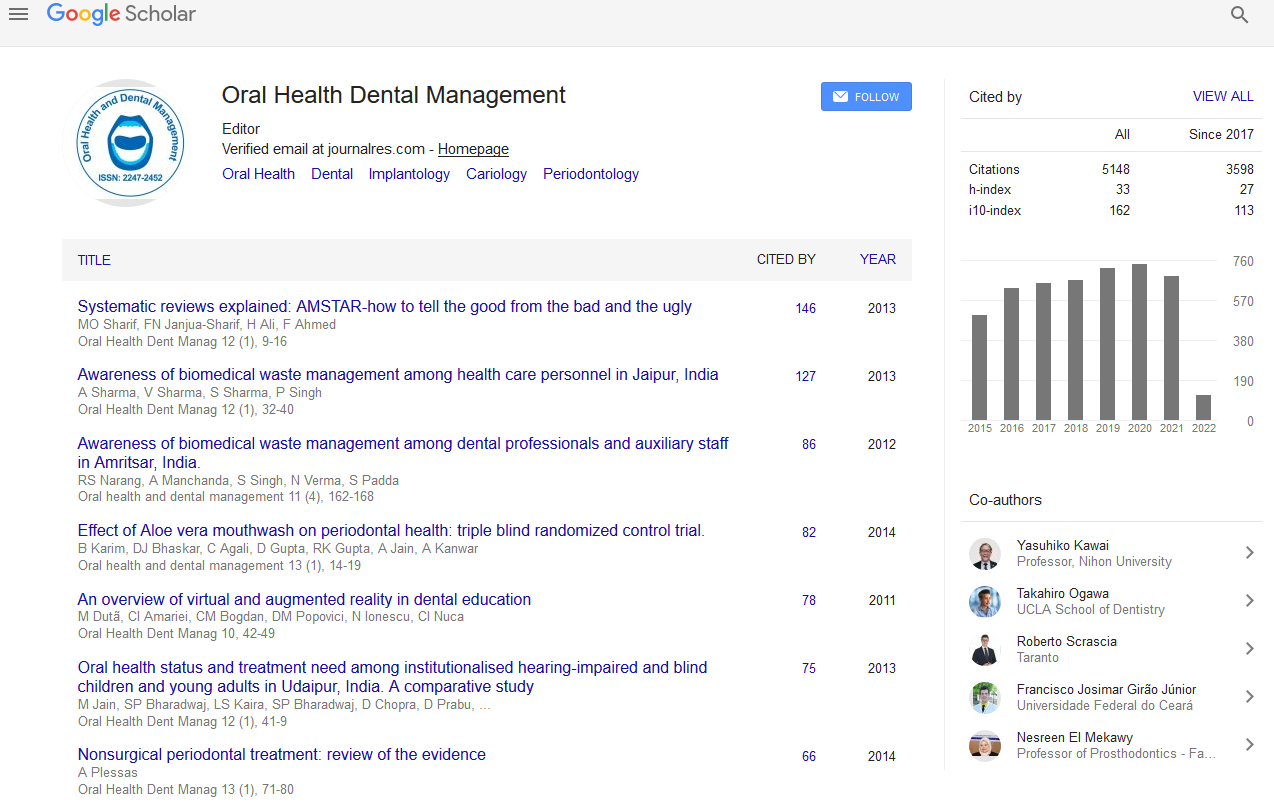Indexed In
- The Global Impact Factor (GIF)
- CiteFactor
- Electronic Journals Library
- RefSeek
- Hamdard University
- EBSCO A-Z
- Virtual Library of Biology (vifabio)
- International committee of medical journals editors (ICMJE)
- Google Scholar
Useful Links
Share This Page
Journal Flyer

Open Access Journals
- Agri and Aquaculture
- Biochemistry
- Bioinformatics & Systems Biology
- Business & Management
- Chemistry
- Clinical Sciences
- Engineering
- Food & Nutrition
- General Science
- Genetics & Molecular Biology
- Immunology & Microbiology
- Medical Sciences
- Neuroscience & Psychology
- Nursing & Health Care
- Pharmaceutical Sciences
Time to treatment for mandibular fractures including complications of delayed treatment
2nd International Conference and Exhibition on Dental & Oral Health
April 21-23, 2014 Crown Plaza Dubai, UAE
Giath Gazal
Accepted Abstracts: Oral Health Dent Manag
Abstract:
Aims: The aims of this study were: To determine time to treatment of mandible fractures and to evaluate the effect of delayed treatment on the incidence of complications. The gold standard of this Audit: No patients needing urgent treatment should be treated outside of 24 hrs. Delay of mandibular fracture treatment greater than 72 hours does not significantly increase infection risk. Design: A retrospective review of mandibular fractured patients treated at the Newcastle General Hospital during the period from April 2011 to Oct 2011 was performed. Subjects and method: The Retrospective research audit included 94 patients aged 14-60 years, attended both Trauma and Maxillofacial Operating Theatres where the Open Reduction and internal Fixation (ORIF) of fractured mandibles were carried out. Four time entries were recorded in order to determine length of time between injury and operative intervention. Patients were classified into three groups according to Length of time to treatment from admission to operative intervention (<24, <72 or ≥72 hrs). Complications of treatment were recorded one week and four weeks postoperatively. Results: It was found that there were 38% of patients with mandible fracturestreated less than <24 hrs, 52% less than <72 hrs and 10% more than >72 hrs according to time to treatment from admission to operative intervention. There was significant increase in median time to treatment from admission to operative intervention for patients in maxillofacial theatre comparing with the patients in trauma theatre(P-values were <0. 001). Patients with mandible fractures related to RTC have higher median time to treatment from admission to operative intervention than other present complaints. Conclusion: The majority of cases presented at during the week (64. 5%). Of the 33 who presented and were treated at the weekend 51. 5% (17 patients) treated within <24 hours. The majority of patients treated during the week between 9am and 5 pm were treated between 24 hrs and 72 hrs (34 / 60: 56. 7 %).

